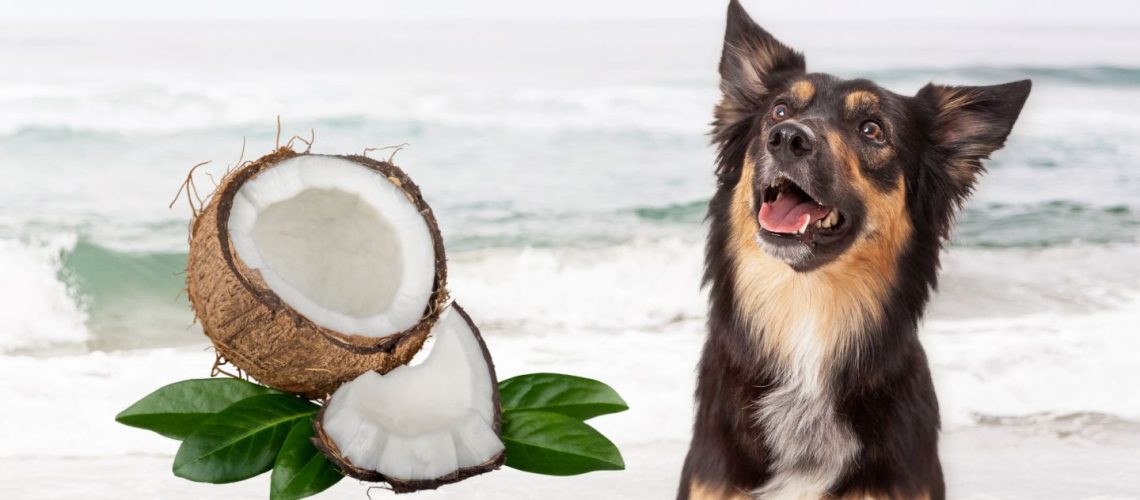Yes, dogs can eat coconut in moderation. Coconut is safe for dogs to eat, and can provide some health benefits due to its high fiber and healthy fat content. However, it is important to feed coconut to your dog in moderation, as it is high in calories and can cause digestive upset if consumed in large amounts.
Health Benefits of Coconut for Dogs
Lauric acid and immune system support
Coconut contains lauric acid, a medium-chain fatty acid that has been shown to have antimicrobial and antiviral properties. This can help to boost your dog's immune system and protect against bacterial and viral infections.
High fiber content and digestion
In addition, the fiber in coconut can help to improve your dog's digestion and prevent constipation.
Fresh breath benefits
Moreover, feeding coconut can also help you to get rid of bad doggy breath and help your dog breathe without stinky dog breath.
How Much Coconut Should I Feed My Dog?
Introducing coconut to your dog's diet
When introducing coconut to your dog's diet, it is important to start with small amounts and monitor your dog's reaction.
Recommended serving size based on size and weight
A good rule of thumb is to feed your dog no more than 1-2 tablespoons of coconut per day, depending on their size and weight.
Maintaining a balanced and nutritious diet
It is also important to remember that coconut should not make up a significant portion of your dog's diet, and should be fed in combination with a balanced and nutritious diet.
Potential Risks of Feeding Coconut to Dogs
High fat content and digestive upset
While coconut is generally safe for dogs to eat in moderation, there are some potential risks to be aware of. For example, the high-fat content of coconut can cause digestive upset in some dogs, leading to diarrhea or vomiting.
Fiber obstruction in intestines
In addition, the fibers in coconut can cause obstruction in the intestines if consumed in large amounts.
Avoiding coconut oil and pancreatitis risk
It is also important to avoid feeding your dog coconut oil, as it can cause pancreatitis in some dogs.
Safe Coconut Products for Dogs
Fresh coconut
Fresh coconut is the best option for feeding coconut to your dog, as it is free from additives and sweeteners that may be found in some processed coconut products.
Coconut flakes
Unsweetened coconut flakes are another option for including coconut in your dog's diet, and can be easily sprinkled over your dog's regular food.
Coconut-based dog treats
There are also coconut-based dog treats available on the market that can provide a convenient and healthy option for treating your dog.
How to Prepare Coconut for Your Dog
Removing the shell
When preparing fresh coconut for your dog, be sure to remove the hard outer shell, as it can pose a choking hazard or cause injury if ingested.
Grating or shredding the coconut
After removing the shell, grate or shred the coconut to create small, easily consumable pieces for your dog.
Storing and preserving coconut
Store any unused coconut in an airtight container in the refrigerator to keep it fresh for future use.
Consult Your Veterinarian
Discussing dietary changes
Before introducing coconut to your dog's diet, it is best to consult with your veterinarian to ensure that it is a safe and appropriate addition to their diet.
Monitoring your dog's reaction to coconut
Your veterinarian can help you monitor your dog's reaction to coconut and provide guidance on appropriate serving sizes.
Addressing any concerns or complications
If you have any concerns about your dog's reaction to coconut or any complications that may arise, be sure to consult your veterinarian for assistance and guidance.
Conclusion
In conclusion, dogs can safely eat coconut in moderation. Coconut can provide some health benefits for dogs, but it is important to feed it in moderation and to avoid feeding your dog coconut oil. As with any new food, it is important to introduce coconut to your dog's diet slowly and to monitor their reaction. If you have any concerns, it is always best to consult with your veterinarian before feeding your dog coconut.











